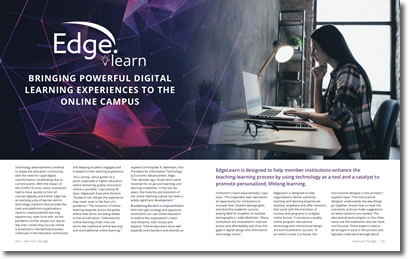Technology advancements continue to shape the education community, with the need for rapid digital transformation accelerating due to current events. With the impact of the COVID-19 crisis, many institutions had to move quickly to host all courses digitally and online. Edge has an evolving suite of learner-centric technology solutions that provide the tools and platforms organizations need to create powerful learning experiences, even from afar. As the pandemic further shapes our day-to-day lives, conducting courses online is essential to maintaining business continuity in the education community and keeping students engaged and invested in their learning experience.
“As a society, we’ve gotten to a point, especially in higher education, where delivering quality instruction online is possible,” says Joshua M. Gaul, EdgeLearn Executive Director. “Students can still get the experience they need, even in the face of a pandemic.” The evolution of online learning expands across the globe, where new terms are being added to the conversation. “International online learning circles now use terms like traditional online learning and nontraditional online learning,” explains Christopher R. Markham, Vice President for Information Technology & Economic Advancement, Edge. “Two decades ago, those terms were reserved for on-ground teaching and learning modalities. In the last ten years, the maturity and evolution of the online teaching culture has been a pretty significant development.”
Broadening Borders to Expand Reach
With the right strategy and approach, institutions can use online education to extend the organization’s reach and influence, both locally and beyond. “Online education done well expands one’s borders and extends an institution’s reach exponentially,” says Gaul. “This expanded view represents an opportunity for institutions to increase their student demographic and level the academic success playing field for students of multiple demographics,” adds Markham. “Many institutions are motivated to improve access and affordability and close the gaps in digital design and information technology circles.”
EdgeLearn is designed to help organizations deliver authentic teaching and learning experiences anytime, anywhere and offer solutions that assist with the transition of courses and programs to a digital, online format. To produce a quality online program, educational technology and instructional design are both essential to success. “If an online course is a house, the instructional designer is the architect,” explains Gaul. “The instructional designer understands the way things go together, knows how to meet the outcomes, and can make suggestions on what solutions are needed. The educational technologists on the other hand, are the tradesmen and are more tool-focused. These experts need to be brought in early in the process and typically understand enough about instructional design to identify where each piece fits into the pedagogical design and learning methodologies.” Unfortunately, many organizations lack the budget to have both of these critical positions on staff. Edge can help supplement an institution’s IT team in a cost-effective way and provide the expertise and experience necessary to transition to an online platform.
Creating a Holistic Online Campus
EdgeLearn is designed to help member institutions enhance the teaching-learning process by using technology as a tool and a catalyst to promote personalized, lifelong learning. The development of a complete online campus has many facets, including business modeling, financial modeling, strategic plan and practical professional services in marketing, recruitment, course and program constitution, and online delivery. “Edge provides a roadmap for each important area of development; dividing the overall mission into four buckets,” says Markham. “These buckets include marketing and recruitment, course development and administration, faculty recruitment and development, and online campus management and coordination.”
Edge recently partnered with New Jersey City University (NJCU) to help enhance the institution’s ability to teach online and offer guidance and tools in each area of online learning development. “Our goal is to take advantage of the enthusiasm, expertise, and leadership that is already at NJCU and give them the support and processes they need to make their dreams come to fruition, especially in teaching online,” shares Gaul. “We are helping NJCU be well-prepared for future events and be in a prime position to increase online programs and courses if needed in a quicker, streamlined way.”
Gaul says the same methodology that has helped NJCU digitally transform can help other organizations as well. In regards to marketing and recruitment, Edge will analyze the market and target opportunities for a particular organization. “We establish an order for programs to launch and we work with the institution to construct and establish plans and techniques that are best suited for their goals and are proven online student recruiting models in the industry,” explains Markham. “Edge also will assist enrollment and recruiting officers through digital marketing strategies.”
With course development, an institution can access key leadership and work with Edge collaboratively to establish instructional design criteria, build a master course library, ensure controls of different course versions, and build out a teaching schedule. “We will ensure all these factors come together and lay the groundwork for quality control measures that are consistent and repeatable,” says Markham. “Edge will also help assign architects as online courses are developed and establish what is needed in adjunct faculty capacity to ensure complete quality assurance.“
Edge can also offer assistance with online campus management to integrate the online course catalog with the business processes that support registration. “We look at how to align courses with the institutional business processes and financial models,” says Markham. “Our goal is to successfully support students and allow faculty to focus on what they do best—teaching and research.”
“In order for an online campus and a virtual campus at an institution to succeed, there needs to be not only financial support but strategic support. You also need buy-in from the faculty and the students. If a school’s online programs do not have the respect from their faculty or their administration, then they’re not going to get the respect from the students. Each course must provide students with an authentic and quality experience, just as they would receive in person or with a hybrid course.”
Joshua M. Gaul
EdgeLearn Executive Director, Edge

Building an Online Brand
Developing a powerful online campus takes creating a distinct, virtual brand that ties into the larger voice and mission of the institution. “In order for an online campus and a virtual campus at an institution to succeed, there needs to be not only financial support but strategic support,” says Gaul. “You also need buy-in from the faculty and the students. If a school’s online programs do not have the respect from their faculty or their administration, then they’re not going to get the respect from the students. Each course must provide students with an authentic and quality experience, just as they would receive in person or with a hybrid course.”
Markham says operationally, the revenue and expenses side of developing an online campus is also critical. “When institutions do not operate and market their online campus as a distinct entity that maps to the organization’s mission and vision, they cannibalize on their own student population and demographics. This dynamic creates a financial loss situation in the long term that is economically unsound. An online campus needs to operate as its own distinct entity so an organization can manage finances and control expenses in order to maximize return-on-investment for the institution. The additional capital can then be invested into faculty development, improving the teaching and learning experience, expanding educational resources, and enhancing the overall student experience.”
Ensuring Online Learning Success
Building a successful online campus takes a sound business model and an appropriate launch sequence for building and sustaining each key project area: marketing and recruitment, course development and administration, faculty recruitment and development, and online campus management and coordination. “An organization needs quality pedagogy with academic freedom,” says Markham. “With the right business model in place, you can have the best of both worlds where you preserve this arsenal of democracy, while at the same time, support the ability to grow and evolve.” Gaul adds that the educational community has the capability to establish standards in online instruction. “We have the ability to set standards, not just pedagogical standards, but design criteria and thinking processes. Students want instructors who know how to leverage the school’s online platform and have worked with their instructional designers, educational technologists, student services, and librarians to put together an impactful and exciting learning course.”
The shift to include virtual learning will likely continue to become an integral part of the education community, especially in institutions of higher education. EdgeLearn tools are designed to offer instructors and students pathways for mobile, hybrid, and online learning, and can help member institutions find effective solutions for boosting student engagement in an ever-changing digital era.
Ready to create a powerful online learning experience? Explore the many valuable solutions and partnerships of EdgeLearn at NJEdge.net/solutions/EdgeLearn.
“We look at how to align courses with the institutional business processes and financial models,” says Markham. “Our goal is to successfully support students and allow faculty to focus on what they do best—teaching and research.”
Christopher Markham
Vice President for Information Technology and Economic Advancement, Edge




